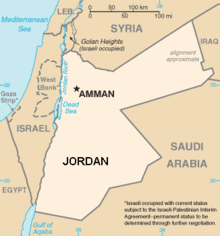2005 Amman bombings
This article documents a current event. Information may change rapidly as the event progresses, and initial news reports may be unreliable. The latest updates to this article may not reflect the most current information. |

The 2005 Amman bombings were a series of coordinated suicide bomb attacks on three hotels in Amman, Jordan on November 9, 2005. The explosions, at the Grand Hyatt Hotel, the Radisson SAS Hotel, and the Days Inn, started at around 20:50 local time (18:50 UTC) at the Grand Hyatt.[1][2].
Current reports
Jordanian Deputy Prime Minister Marwan al-Muasher announced that at least 67 people have died and 300 people have been injured. However, the Jordanian government subsequently revised the number of casualties down to at least 56 dead and 115 injured, but the adjustment in figures was not explained. According to one Jordanian official, Maj. Bashir al-Da'aja, local authorities have confirmed a series of coordinated suicide attacks as the cause of the blasts.
Although earlier reports indicated the possible use of a man bomb in the Days Inn blast [3], authorities now believe the attackers used explosive belts in all three blasts. Authorities have also confirmed that the Radisson explosion, the largest of the three, struck a wedding ceremony with over 300 guests. Although the bride and groom survived the blast, both fathers, along with 11 other relatives, were killed. Syrian film director Moustapha Akkad, who was at the Hyatt hotel lobby, was severely wounded and his daughter Rima was killed [4]. Among the dead were 33 Jordanians, six Iraqis, five Palestinians, two Bahrainis, three Chinese, one Saudi, one Indonesian, one U.S. citizen[5], and one Israeli [6].
The Palestinian fatalities included Major-General Bashir Nafeh, the head of military intelligence in the West Bank, Colonel Abed Allun, a high-ranking Preventive Security forces official, Jihad Fatouh, the commercial attache at the Palestinian Embassy in Cairo, and Mosab Khorma a senior Palestinian banker. An Israeli Arab businessman, Husam Fathi Mahajna, was also killed. [7]
Source of the attacks
An Internet statement released the day after, purportedly from Al-Qaeda in Iraq, claimed that they had carried out the attacks. Members of the Jordanian government had already begun blaming the attacks on the islamic terrorist group, which counts the Jordanian Abu Musab al-Zarqawi, among its leaders. "The attacks carry the trademark of al Qaeda", one police official said. Two U.S. intelligence officials agreed, describing the style of the attacks as bearing the trademark of al-Zarqawi, who has, in the past, discussed the possibility of launching attacks outside of Iraq. Of late, there have been concerns that terrorist attacks may occur in Jordan, due in part to its close proximity to Iraq, but also due to its government's cooperation in the United States' War on Terrorism.
Notably, the Radisson hotel was previously an al Qaeda target during the 2000 millennium attack plots. Jordanian police foiled the original attempt after arresting Khadr Abu Hoshar, a Palestinian militant, along with 15 others on December 12, 1999. All three of the hotels are frequented by American, Israeli, and European journalists, business people, and diplomats, and the city itself has long been described as a "gate way" for westerners into Baghdad and Iraq at large, leading many to entertain the possibility of a connection between the Amman bombings and the war in Iraq.
Response
Abdullah II, the King of Jordan, cut short a state visit to Kazakhstan and returned to Jordan where he pledged that "justice will pursue the criminals" and condemned the attacks. King Abdullah also cancelled an upcoming visit to Israel. U.N. Secretary-General Kofi Annan had planned to visit Jordan on 10 November 2005 but postponed the trip in light of the bombings. He issued a statement "strongly condemning" the attacks, and underscoring the need for additional security measures against terrorist attacks worldwide. A spokesman for the White House called the bombings "a heinous act of terror", while United States Secretary of State Condoleeza Rice called the bombings a "great tragedy" that show "the very difficult war that we're fighting". Israeli Prime Minister Ariel Sharon called King Abdullah and offered his condolences, as well as assistance in the recovery efforts. President George W. Bush said in response "The bombing should remind all of us that there's an enemy in the world that is willing to kill innocent people, willing to bomb a wedding celebration in order to advance their cause."
